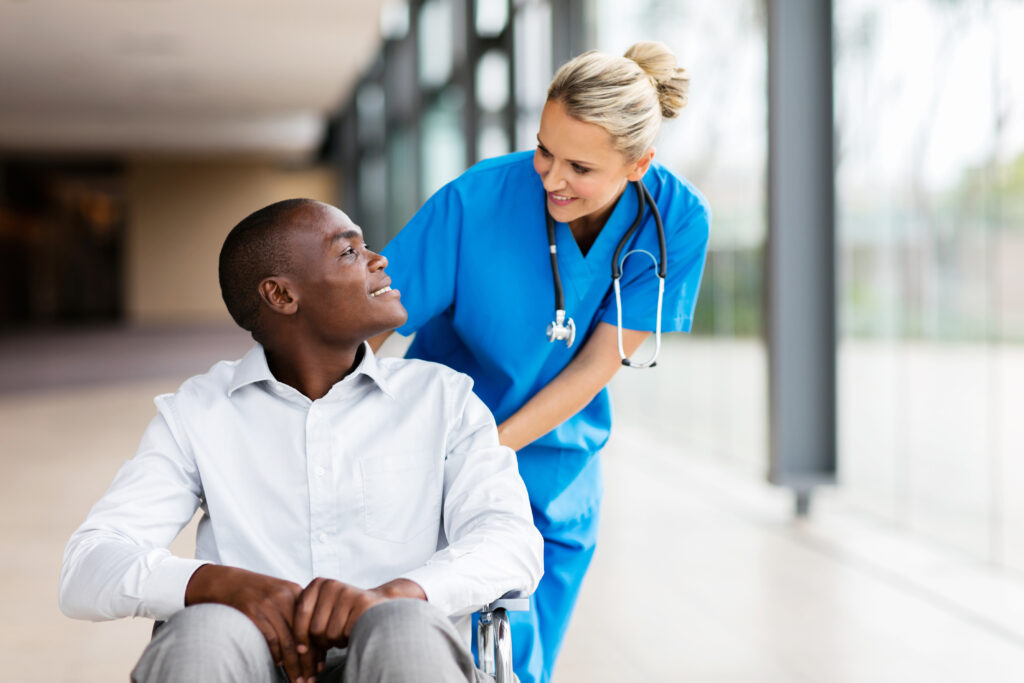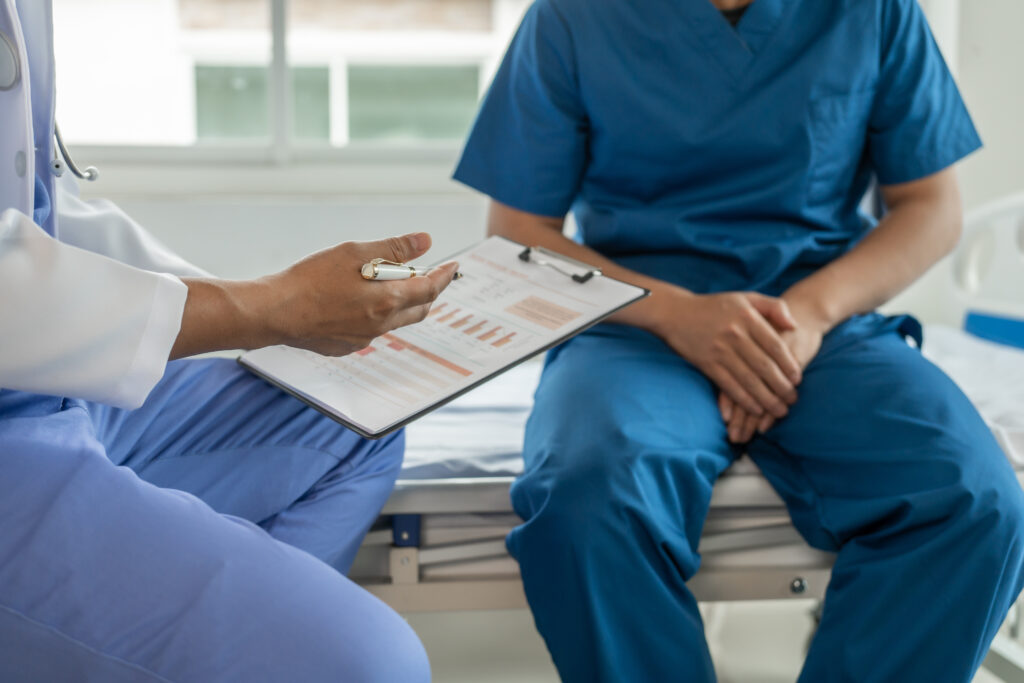About Your Surgery
Procedure Guidlines
Please review these guidelines before your procedure to ensure a
smooth and successful surgery.
Before Procedure
- Your physician and/or the anesthesiologist will determine any pre-operative testing you may need before your surgery.
- A pre-operative nurse will contact you prior to your procedure. This call will include health assessment instructions for the day of surgery, and you will address any questions or concerns you may have.
Day of Procedure
- Please leave valuables at home
- Your physician or a registered nurse will inform you of any eating or drinking restrictions before your surgery. It is very important that you follow the instructions; if you do not, your surgery may be delayed or canceled.
- Wear comfortable clothing. If you are having surgery on your foot or leg, wear loose-fitting clothing that will fit over a large or bulky dressing, etc.
- Bring any medications you may need during your stay (e.g., Asthma inhalers, Insulin, etc).
After Procedure
- You will need a responsible adult to drive you home. You will not be permitted to drive after your procedure, and your procedure may be moved to another time if you do not have a responsible adult to drive you home. Pediatric patients must have a responsible adult accompanying them.
- Your physician or a clinical staff member will give you instructions regarding the medications you are taking or have been prescribed.
- Visitors Policy
Following Your Surgery
- After your surgery you will be taken to the Recovery or Post Anesthesia area, a nurse will monitor you and make sure you are comfortable. When you are awake and alert you will be reunited with a family member. If a child has had surgery the child will be reunited with a parent as soon as it is safe and appropriate.
- After surgery, you will be provided with discharge instructions that include what you can eat and drink, activity restrictions, medication instructions, and post-operative care. Of course, if you have any questions regarding your post-operative care, you are encouraged to contact your surgeon.
- You will not be permitted to drive after a procedure, a responsible adult will be required to drive you home. You will not be discharged into a taxi or uber without a responsible family member to accompany you.
- Follow your instructions, wash your hands often, preventing infection is important
- For 24 hours after your surgery, adhere to the following:
- Have a family member or friend drive you home and stay with you.
- Ask your family members and other care providers to wash their hands frequently
- Do not drive, sign important documents, or make critical important decisions.
- Do not operate machinery, power tools or appliances.
- Do not drink alcoholic beverages.
Pre-operative tests that may be required will be determined by your physician or anesthesiologist and communicated to you prior to the date of your surgery.
Yes, you will receive a call from a Pre-Op nurse to review your health history and to answer any questions you may have.
- You will be informed of your arrival time and you will receive instructions for food and drinking restrictions and you will be asked to avoid drinking alcohol and smoking for 24 hours prior to your procedure.
- You will be instructed to remove nail polish, body piercings including those you cannot see, and false eyelashes;
- To leave our jewelry and valuables at home;
- To contact our doctor if you develop a cold fever, respiratory infection or other illness or change in our health or medical condition.
- You will be given instructions regarding medications you are currently taking.
- Photo identification
- Insurance cards
- Any medications you are currently taking, please bring them in the original prescription bottle the medication came in. If you are taking medications you may need during your stay please bring them in the original bottle or container e.g., inhaler, insulin, or cardiac medication.
- Take a shower the night before your surgery and the morning of your surgery
- Wash your hair, dry your hair
- Wash with an antibacterial soap and avoid using creams and lotions
- Do not clip or shave the area where you are having surgery, only your doctor will tell you if you should shave before your procedure
- Wear loose fitting, comfortable clothing and shoes
- Arrive at the time you were instructed to by the pre-op nurse
- Bring the storage case for glasses, contacts or hearing aids
- Make arrangements with a responsible adult to accompany you to the Center and to drive you home
- Ask your family and other care providers to wash their hands frequently.
- If you think you may be pregnant notify your physician, anesthesia provider and Registered Nurse before the day of your surgery.
Pediatric Patients
It is very important that you follow the eating guidelines exactly as you are instructed by the Nurse during the pre-operative phone call. In order to ensure your child’s safety and that the procedure does not get cancelled. The following are meant as guidelines only. The pre-op call nurse will go over your child’s eating guidelines. Nothing to eat or drink after midnight the night before.
- Solid foods
- Candy, gum
- Milk and milk products (i.e. pudding, ice cream, yogurt)
- Hot or cold cereal
- Orange juice or any other juice containing pulp
- If your child is on formula and younger than six months, stop giving formula six hours before arrival at the center unless instructed otherwise. (Bring the appropriate formula to the Center with you)
- If your child is on breast milk, please stop feeding four hours prior to your arrival at the center.
- If your child is under 5 years of age he/she may have clear liquids up until 4 hours of the procedure unless other instructions are provided by the RN or the anesthesiologist.
- Clear liquids including water, apple juice, white grape juice, popsicles, clear broth, Pedialyte, jello.
Jewelry: Please remove all jewelry from your child prior to coming to Toms River West Ambulatory Surgery Center. This includes earrings, rings, bracelets, necklaces, etc. Leave jewelry at home. We do not want these very small items misplaced.
Nail Polish and Make-up: Please remove your child’s nail polish and make-up prior to your arrival at the center.
Glasses and Contact Lenses: Please have your child wear their glasses to the center and bring their eyeglass case with them for safe storage while in surgery. If your child wears contact lenses, please bring a storage case and saline to properly store the lenses.
Illnesses: If your child should become ill sick, please contact your primary care physician or pediatrician as soon as possible. If your child wakes up sick the day of surgery, you must contact the surgeon.
Dress Attire: Please dress your child in comfortable clothes that are easy to change out of. Sweat suits and other cozy clothing work well. Anything that will make your child feel comfortable and relaxed before and after the surgery is a great choice.
Comfort Item: Your child may have a certain stuffed animal, toy, or blanket that makes them feel happy and safe. We encourage you to bring that item to the center on the day of surgery. If there is waiting time while in the pre-op area or recovery room a child’s TV show can be on or you can bring your child’s tablet to the Center, the table will be left with you when your child is in the operating room.
- You must remain in the Center while your child is in surgery and recovering. Please plan to make sure you do not have to leave the Center during this time.
- When you register at the front reception desk, both you and your child will be given an ID band for identification. Your child will only be discharged to the parent/guardian with the wrist band.
- Please bring your insurance card and photo I.D. when you come to the center.
- Pleases do not bring siblings or other children to the Center on the day your child is having surgery.
- If the pre-op call nurse did not reach you or was unable to obtain a medical history for your child, please bring a list of your child’s medications along with dosage.
- What can my child eat?
- How do I take care of the incision? Surgical site?
- What medications will my child be taking? Dosages?
- What should I do for my child’s pain?
- When can my child take a shower/bath?
- How much activity is my child allowed to participate in?
- When can my child return to school?
- When should I call for a follow-up appointment?



